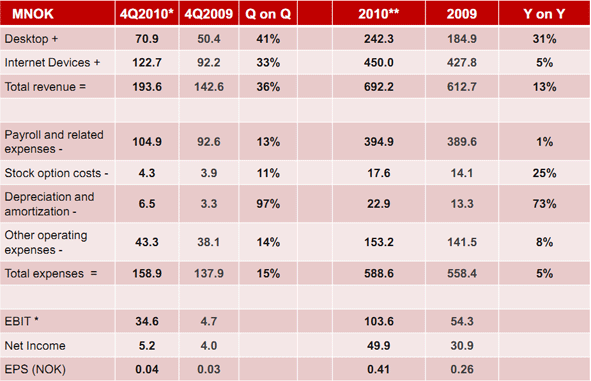Opera Software Q4 2010 Financial Results
Opera Software has recently announced a pretty strong financial results report.
Here are some of the key figures:
Continue Reading
Weekly Browsers Recap + Bonus Links, February 21st

FavBrowser.com
- IE9 RC: 2 Million Downloads
- Majority Of Web Browsers Are Unpatched
- Director of Firefox Leaves Mozilla
- Firefox 5 First Look
- Firefox 4 RC1 Coming Next Week
- Taking a Look at the New Google Chrome 10 Beta
- Gmail Now Uses Chrome’s Built-In Viewer To Open PDFs
- Introducing Google Chrome Web Search Blocklist Extension
- Download Opera 11.10
- Opera 11.10 Coming
- Windows Phone Internet Explorer 9 Mobile vs. Safari
- Opera Mini for iPad
Big Change Coming to Google Chrome
 A lot of news about Google Chrome lately, no? This time it’s about how the next iteration of Google Chrome will implement a feature that only Internet Explorer 9 has so far and that feature is: dropping the address bar.
A lot of news about Google Chrome lately, no? This time it’s about how the next iteration of Google Chrome will implement a feature that only Internet Explorer 9 has so far and that feature is: dropping the address bar.
Despite being one of the most minimalist web browsers already, the next Google Chrome version will save even more screen space.
Don’t worry, the address bar will reappear when users move the cursor over the spot where the address bar normally is. It is a feature that only the beta of Internet Explorer 9 currently boasts but Google seemingly intends to take it a step further.
Continue Reading
Weekly Questions Recap, February 21st

Don’t forget that you can receive points for asking/answering questions and redeem them for cool prizes.
Unresolved
- Web-browser battle: which are you using and why?
- Suggest some skin/theme for firefox, opera, chrome?
- Why does Opera fail to grab a good per cent of user base like IE/Firefox/Chrome?
- What was the first browser you ever used?
- Help to Disable Panel While Checking Feeds?
Answered
Taking a Look at the New Google Chrome 10 Beta
Google released the newest Google Chrome 10 build to the beta channel yesterday, boasting progress in the form of revamped browser settings, password sync features, as well as JavaScript performance.
V8, Chrome’s JavaScript engine, now runs intense JavaScript applications faster than in the past. To be more specific, the V8 benchmark suite indicated an improvement over the current stable release of 66%. See the chart below to see how it compares with prior versions of Chrome.
Continue Reading
Gmail Now Uses Chrome’s Built-In Viewer To Open PDFs
 Users of Google Chrome can now use the built-in PDF viewer instead of Google Docs to view PDF’s from Gmail. As a result, PDF files now open noticeably quicker as well as look more pleasing to the eye and can be viewed by clicking “View” next to an attachment.
Users of Google Chrome can now use the built-in PDF viewer instead of Google Docs to view PDF’s from Gmail. As a result, PDF files now open noticeably quicker as well as look more pleasing to the eye and can be viewed by clicking “View” next to an attachment.
PDF attachments will continue to open via Google Docs viewer when in Gmail, if you are not using Google Chrome or have the PDF viewer plug-in disabled.
As for now, Adobe Reader’s plug-in is not yet compatible with this feature.
Download Opera 11.10
 Here comes the very first build of Opera 11.10 (codenamed Barracuda) by Opera Software.
Here comes the very first build of Opera 11.10 (codenamed Barracuda) by Opera Software.
Before you become too excited, please keep in mind that this is just a first glimpse of what’s yet to come and therefore, does not include a lot of new features.
According to just published post, the Core has been upgraded from version 2.7.62 to 2.8.99 (a very big step forward, according to Manuela Hutter) and now includes Web Open Font Format (WOFF) support.
Continue Reading
Firefox 5 First Look
Even though the Final version of Firefox 4 has not yet been released, Mozilla team is already working on a new UI functionality for the upcoming Firefox 5 (targeted this year) browser.
One of the few new features is tab coloring by favicon (which for some users might be a headache (if can’t be disabled)).
Continue Reading
Firefox 4 RC1 Coming Next Week
 It looks like the development of Firefox 4 is doing well as Mozilla now plans to release the RC build of an open-source web browser later next week on February 25th.
It looks like the development of Firefox 4 is doing well as Mozilla now plans to release the RC build of an open-source web browser later next week on February 25th.
However, don’t forget Beta 12 which should be landing shortly.
As for the Final version, it is targeted for the March release.
Majority Of Web Browsers Are Unpatched
 Wolfgang Kandek, CTO of security risk and compliance management provider Qualys, revealed that approximately 80% of web browsers are susceptible to exploits of bugs that have already been patched. Kandek attributed this mostly to Windows, saying “All the different patching mechanisms are confusing, a bit of this and some of that.”
Wolfgang Kandek, CTO of security risk and compliance management provider Qualys, revealed that approximately 80% of web browsers are susceptible to exploits of bugs that have already been patched. Kandek attributed this mostly to Windows, saying “All the different patching mechanisms are confusing, a bit of this and some of that.”
As discovered by BrowserCheck (which scans Windows, Mac and Linux machines for vulnerable browsers along with browser plug-ins), Oracle’s Java was the most probable plug-in to be outdated for the second year in a row, comprising a total of 40% scanned systems. Adobe’s Reader and Apple’s QuickTime were second and third, taking up 32% and 25% respectively.
Proposed solutions include:
- Microsoft taking charge of patching crucial third party plug-ins via single updater.
- Moving to HTML5, so browsers would no longer require various audio and video processing plug-ins.




